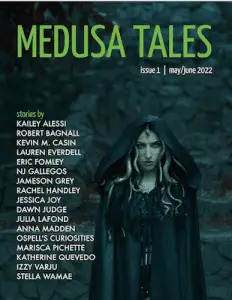Patrick O’Ryan: Transforming Fiction with Medusa Tales
 Patrick O’Ryan: Transforming Fiction with Medusa Tales
Patrick O’Ryan: Transforming Fiction with Medusa Tales
By Angelique Fawns
There is simple alchemy, where one turns metal into gold. Then there is more sublime transformation. The kind where an internal change brings us our highest potential. Patrick O’Ryan is on the hunt for these kinds of stories with his new bi-monthly digital magazine Medusa Tales. With his first issue out in May, I sat down with him to learn more about the birth of a new market place.
 AF: What a clever name for your new magazine. Can you please tell me about the conception and birth of Medusa Tales?
AF: What a clever name for your new magazine. Can you please tell me about the conception and birth of Medusa Tales?
PO: I was sharing transformation stories with other authors on a critique site when some of them floated the idea of starting a magazine. They didn’t have the time or inclination to run it themselves, so I volunteered to lead the project.
AF: When I think of Medusa, I think of literal transformation. Like turning a human into stone. How do you define “stories of transformation?”
PO: I have two definitions of “stories of transformation”: our original concept and the expanded definition. We originally planned to focus on stories in which characters are transformed into solid materials such as stone or gold. Hence the name Medusa Tales.
The expanded definition came about in response to the breadth of stories we received from authors. Transformation was broadly defined to include any sort of physical change. In our first issue, characters undergo an array of transformations: tree, mermaid, fairy, and fish-like human are a few examples. Expanding the definition allowed me to publish some excellent stories that wouldn’t have fit the original vision.
AF: How do you plan to “stand out” in the crowded short story market?
PO: This is a good question. With the first issue of Medusa Tales hot off the press, I’m learning the difference between finding writers and finding readers in a crowded market for short fiction. Finding writers was surprisingly easy. Once I put out the call for stories, word of mouth spread it far and wide. We received 145 stories. On the reader side of the equation, our sales for the first issue are in the single digits. That’s not counting our pledges on Patreon which are about $50 per month.
Differentiating Medusa Tales from the competition is simple enough since we have an odd concept, to begin with. Presenting it as something that resonates with readers is more difficult. I think part of the challenge is finding “our people,” meaning those who enjoy reading transformation stories. They’re out there somewhere. I just need to keep searching and widening the net.
AF: Is there a plan to make money with this project?
PO: We don’t have a plan for profitability. Our plan is to break even. Right now, we’re paying our authors $0.01/word. If our sales and Patreon pledges exceed what we’re paying authors, then we’ll raise the pay rate. The goal is to get to $0.08/word, which is considered a professional rate. That will be a years-long journey if we get there at all, but I don’t want to make a dime from the magazine until we’re paying authors a professional rate. This is very much a passion project.
AF: As a writer myself, I am thrilled to see any market which can help with new exposure. I see there are the “3 Graces” plus yourself creating this project. What are your respective day jobs?
PO: I consider the “3 Graces” to be co-founders of Medusa Tales since the concept started with them. When it comes to running the magazine, though, I’m the one behind the curtain so to speak. The others are caught up in other demanding pursuits, which is fine. They were upfront about that when I decided to give this a shot. Maybe the perception that Medusa Tales has a team behind it lends us some credibility, but the reality is it’s just me wearing all the hats: editing, publishing, marketing, sales, tech, etc.
AF: Any advice or secrets for submitting writers?
PO: I can’t think of any secrets per se. As far as advice, I’d tell writers to be creative and explore new territory. As we’ve discussed, transformation can be interpreted rather broadly. Having said that, I have a soft spot for statue stories and want to publish at least a couple of them in every issue. So, the odds might be a little bit better if someone in the story gets petrified.
AF: What sort of stories really tickle your editor’s pen?
PO: I first got into transformation stories after reading several good ones online. The authors had a certain gift with words and described characters turning to stone or gold in a way that was visual and compelling. I also appreciate the potential for variety while staying within the niche. These can be fantasy stories about Gorgons or King Midas, but they can also be sci-fi tales about petrifying laser devices or anything else that comes to mind.
When I tried writing a transformation story, I quickly realized that doing it well is not easy. Coming up with a new angle or spin can be difficult and writing the actual transformation is a challenge, too. The critique group helped a lot and I improved my skills pretty steadily. I’ve written quite a few stories at this point, but I want the magazine to focus on unsolicited submissions. Maybe I’ll get more of my own work out there down the road in something like a special edition of the magazine.
- About the Author
- Latest Posts
Angelique Fawns writes horror, fantasy, kids short stories, and freelance journalism. Her day job is producing promos and after hours she takes care of her farm full of goats, horses, chickens, and her family. She has no idea how she finds time to write. She currently has stories in Ellery Queen, DreamForge Anvil, and Third Flatiron’s Gotta Wear Eclipse Glasses. You can follow her work and get writing tips and submission hints at http://fawns.ca/.

 Patrick O’Ryan: Transforming Fiction with Medusa Tales
Patrick O’Ryan: Transforming Fiction with Medusa Tales










